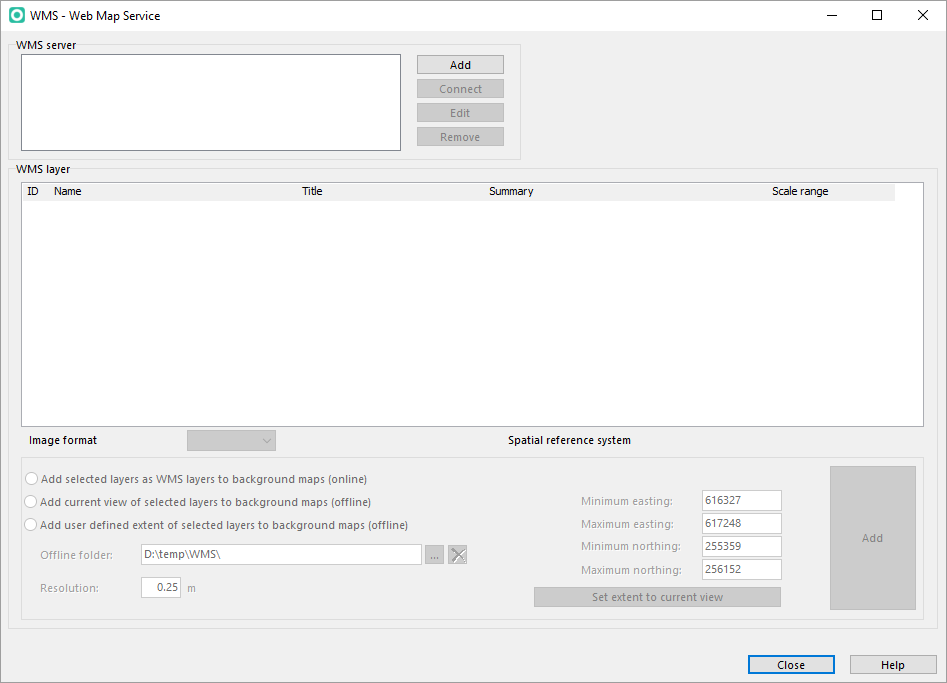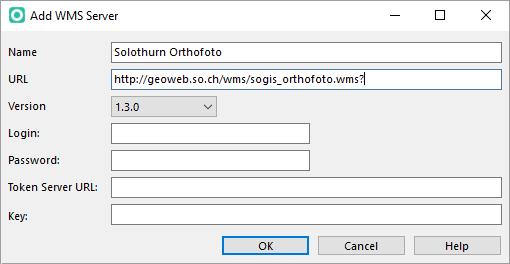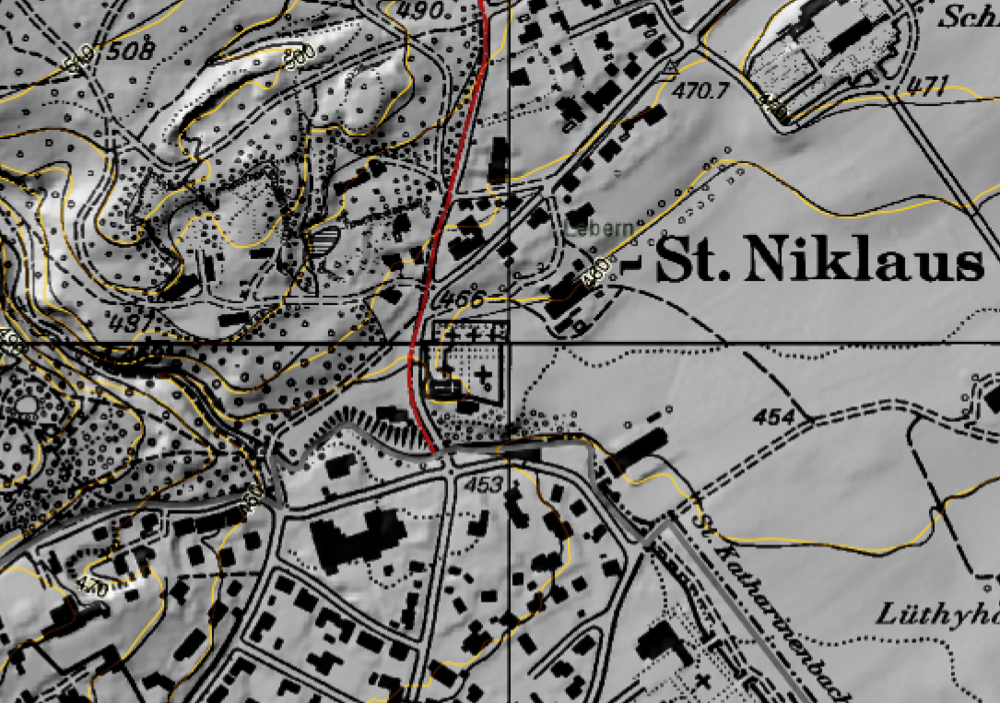WMS
A Web Map Service (WMS) is a standard protocol for serving georeferenced map images over the Internet. The images are generated by a map server using data from a GIS database. (taken from the Wikipedia Article.)
![]() WMS requires a georeferenced map. Choose the Scale and Coordinate System command from the Map menu to set the map scale and a coordinate system. Real world coordinates do not have to be necessarily defined. They can be left at (0/0) for example.
WMS requires a georeferenced map. Choose the Scale and Coordinate System command from the Map menu to set the map scale and a coordinate system. Real world coordinates do not have to be necessarily defined. They can be left at (0/0) for example.
To set up a map from a WMS server choose the WMS - Web Map Service command from the Background Map menu. The WMS - Web Map Service dialog appears.
WMS Server
The WMS servers are listed in the upper box of the WMS - Web Map Service dialog.
Add a WMS Server
- Click the Add button.
- The Add WMS Server dialog appears.
- Enter the Name of the server, the URL, the Version and, if required, a Login with Password, the Token Server URL and a Key.
- Click the OK button when finished.
- The WMS server appears in the WMS server box.
Connect to a WMS Server
Select a WMS server from the list and click Connect. If the connection was successful, OCAD gets a list from the server with the available layers. These layers are listed in the WMS layer table of the WMS - Web Map Service dialog. Read the WMS Layer article to learn how to use layers as Background Maps.
 A bug with the error message 'Could Not Load SSL Library' is fixed since OCAD 11.1.7.1385.
A bug with the error message 'Could Not Load SSL Library' is fixed since OCAD 11.1.7.1385. Internet connection via proxy server is supported since OCAD 12.1.2.
Internet connection via proxy server is supported since OCAD 12.1.2.
Edit WMS Server Properties
Select a WMS server and click the Edit button to edit its properties. The Edit WMS Server Properties dialog appears which is equal to the Add WMS Server dialog.
Remove a WMS Server
Click the Remove button to remove the selected WMS server from the list.
WMS Layer
After connecting to a WMS server the available WMS layers are listed in the WMS layer box.
- Choose the Image format.
- Choose one of these options:
- Define an Offline folder if one of the offline options is chosen.
- Define the Extent (minimum easting, maximum easting, minimum northing, maximum northing) and the Resolution if the option Add user defined extent of selected layers to background maps (offline) is chosen.
![]() Web Map Services generally provide their images in multiple spatial reference systems. OCAD can only access to WMS if the OCAD maps' coordinate system (ex. Swiss Grid CH1903) is supported by the WMS. Then the Spatial reference system is automatically set to the corresponding EPSG code. If the chosen coordinate system is not compatible with the WMS, the Spatial reference system box at the lower part of the dialog remains empty.
Web Map Services generally provide their images in multiple spatial reference systems. OCAD can only access to WMS if the OCAD maps' coordinate system (ex. Swiss Grid CH1903) is supported by the WMS. Then the Spatial reference system is automatically set to the corresponding EPSG code. If the chosen coordinate system is not compatible with the WMS, the Spatial reference system box at the lower part of the dialog remains empty.
Add Selected Layers as WMS Layers to Background Maps (Online)

Select a WMS layer in the list, choose an Image format from dropdown list (those formats are provided by the WMS server), the option Add selected layers as WMS layers to background maps (online) and click the add button.
 The Background map (Geo-Referenced) dialog appears if no real world coordinates offset is set. Choose an offset and click the OK button.
The Background map (Geo-Referenced) dialog appears if no real world coordinates offset is set. Choose an offset and click the OK button.
The WMS layer appears in the table of the Manage Background Map dialog which can be displayed in the Background Map menu.
This is an online Background Map. Everytime the view of the map is changed, the Background Map gets updated from the WMS server. Updating the online Background Map can take a moment. Choose the online Background Map option only if you are using a fast WMS server and a high speed internet connection. As an alternative, you can add the layer as an offline Background Map.
Add Current View of Selected Layers to Background Maps (Offline)

Select a WMS layer in the list, choose an Image format from the dropdown list (those formats are provided by the WMS server), choose the option Add current view of selected layers to background maps (offline) and click the Add button.
 The Background map (Geo-Referenced) dialog appears if no real world coordinates offset is set. Choose an offset and click the OK button.
The Background map (Geo-Referenced) dialog appears if no real world coordinates offset is set. Choose an offset and click the OK button.
The WMS layer appears in the table of the Manage Background Map dialog which can be displayed in the Background Map menu.
This is an offline Background Map. An image of the chosen WMS layer of the current view was downloaded from the WMS server and is now available as a custom background map in OCAD. It does not get updated when changing the view.
Add User Define Extent of Selected Layers to Background Maps (Offline)

Select a WMS layer in the list, choose an Image format from the dropdown list (those formats are provided by the WMS server), choose the option Add user defined extent of selected layers to background maps (offline) and click the Add button.
 The Background map (Geo-Referenced) dialog appears if no real world coordinates offset is set. Choose an offset and click the OK button.
The Background map (Geo-Referenced) dialog appears if no real world coordinates offset is set. Choose an offset and click the OK button.
The WMS layer appears in the table of the Manage Background Map dialog which can be displayed in the Background Map menu.
This is an offline Background Map. An image of the chosen WMS layer of the current view was downloaded from the WMS server and is now available as a custom background map in OCAD. It does not get updated when changing the view.
Click the Close button when finished. You can manage the view or remove the WMS maps by choosing the Manage command from the Background Map menu.
Examples to display the map:
Back to the Background Map page.








